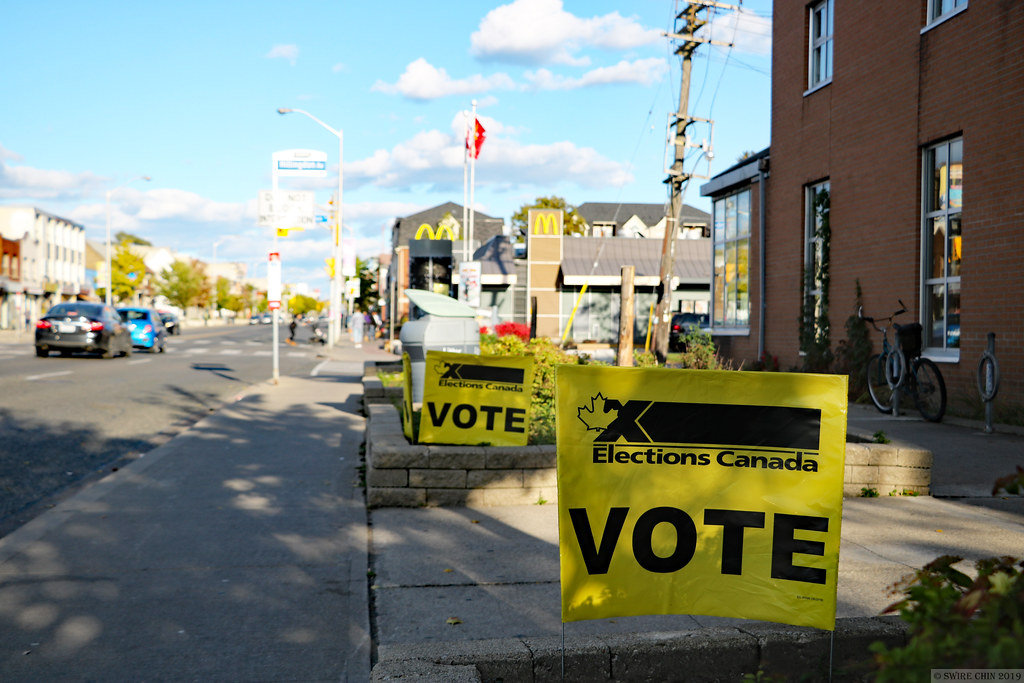Since the 2016 U.S. Presidential Election, when 13 Russian nationals and three companies interfered to spread disinformation and bolster Donald Trump’s campaign, foreign interference has been a primary concern for democratic countries including Canada. In fact, from the Canadian Federal Election in 2015 to the next Federal Election in 2019, the number of elections in OECD countries targeted by foreign threats more than tripled. In the age of the internet, foreign interference poses a potent threat to democratic processes. Essentially, foreign actors are able to manipulate vulnerabilities in media ecosystems in order to promote their disinformation messages to a large audience. Although foreign interference may be at the forefront of American public consciousness and public discourse, it is imperative that Canadians remain vigilant and prepared.
Foreign interference in elections can occur through a variety of modes, including blackmail, bribes, cyber attacks, and by spreading disinformation online. All of these exemplify attempts to covertly influence voting behavior and pursue the strategic interests of a foreign state. The goals of foreign interference are to influence election outcomes, suppress voter participation, and call into question the legitimacy of the electoral process. Other strategic goals are long term oriented, such as seeking to polarize political discourse, advance a foreign state’s geopolitical goals, and erode confidence in democracy. The threat of foreign interference therefore is one of high concern to democratic countries as it undermines the democratic processes and harms states’ sovereignty.
Although foreign interference in elections is not a new phenomenon, the Canadian government has been particularly watchful of the threat of foreign actors who may manipulate the digital media ecosystem to amplify polarizing discourses. Foreign states and domestic actors alike propagate disinformation through ‘troll’ users and deceptive advertisements on social media platforms that promote inflammatory and divisive content. Scrolling through Twitter and being bombarded with clickbait headlines that impersonate real news sources, it is easy to get caught up in the disinformation that floods our feed. Canadians and web-users in general must be particularly cautious of what they read and repost, especially during election periods.
Although foreign interference in elections is not a new phenomenon, the Canadian government has been particularly watchful of the threat of foreign actors who may manipulate the digital media ecosystem to amplify polarizing discourses.
The Communications Security Establishment (CSE) assesses that Canada is a lower-priority target for online foreign interference relative to other democratic states. Despite this, the CSE has also maintained that it is highly likely Canadian voters will encounter some form of cyber interference during federal elections. Canadians are also highly susceptible to cyber threats: 94% of Canadians have a social media account on at least one platform, with 83% having a Facebook account. Thus, disinformation campaigns sponsored by foreign state actors should be of high concern for Canadians, as there is a high chance Canadians will encounter it during election periods.
In preparation for the likely threat of intervention in the 2019 federal election, the Canadian government undertook the cumbersome task of creating legislative and administrative measures to protect the election from subversion. The government created the Security and Intelligence Threats to Elections (SITE) Task Force to assess the threat of foreign interference in electoral processes. It also created the Critical Election Incident Public Protocol (CEIPP) as a nonpartisan process to inform Canadians of any incidents that threaten Canada’s ability to have a free and fair election.
Canada also passed the Election Modernization Act (EMA) as a legislative amendment to the Canada Elections Act of 2000. The Act updated several rules that specifically address attempts to disrupt electoral campaigns and voting by foreign actors. The biggest changes were made to advertisement rules during elections. Previously, foreign third parties could spend up to $500 on ads during a federal election. The EMA now prohibits them from spending on partisan advertising during pre-election and election periods. Political parties and third parties that run partisan ads are now obligated to identify themselves in their ads and must open a separate bank account for their ad-related expenses. The EMA also requires platforms that sell ad space to maintain and publish a registry of all election advertising in order to increase transparency regarding the participation by third parties in the election. Additionally, the Act also prohibits anyone associated with political parties from publishing false statements with the intent of affecting election results.
Although Canada’s media ecosystem is more resilient than other countries due to Canadians’ trust in traditional news sources, digital media platforms still play an important role in democratic elections.
Despite the well-founded fear of foreign interference in the 2019 Federal Election, there is not much evidence that foreign actors played a substantial role in that election. Although the Canadian Security Intelligence Service (CSIS) and CSE reported they observed suspicious activity, the threat was never deemed serious enough to warn the public. However, the observed presence of disinformation shows that Canada was right to act in a hawkish and prudent manner in preparing for the election. For example, ahead of the federal election bots on Twitter tweeted the hashtag #TrudeauMustGo hundreds of times a day, making it a trending topic in Canada. Other cases of misleading information about the election involved the use of visual disinformation in the form of memes, particularly on ‘second-tier’ platforms such as Pinterest and Reddit. These platforms were largely overlooked by the Canadian government and therefore did not fall under their restrictions. In the case of Pinterest, researchers found that users only had to click on one hyper partisan anti-Trudeau meme for the algorithm to direct them to misleading political content and far-right propaganda.
Limited foreign interference was present in the 2021 Federal Election, according to Disinfowatch, this time by the Chinese Communist Party (CCP) that sought to undermine the credibility of Chinese-Canadian federal candidates and Erin O’Toole the Conservative Party leader. The Global Times tabloid platform, which is owned by the CCP, published an article on September 9, 2021 seeking to discredit the Conservatives’ foreign policy platform toward China and spread explicit CCP propaganda. Researchers at Disinfowatch also reported that the Chinese government published and promoted disinformation on Canadian-Chinese websites and on WeChat targeting Chinese-Canadian voters and undermining Canada’s democratic institutions.
However, attention must not only be paid to foreign actors, but also domestic actors that seek to manipulate social media and spread disinformation. Although Canada’s media ecosystem is more resilient than other countries due to Canadians’ trust in traditional news sources, digital media platforms still play an important role in democratic elections. Social media remains a powerful tool for foreign actors to manipulate the public in order to weaken democracies. Canada’s legislative measures on advertising focuses mostly on foreign actors, leaving a huge weak spot for Canadian-nationals that may publish disinformation. Thus, the Canadian government must remain vigilant to the threat of foreign interference while continuing to navigate the complexities of forcing social media platforms to moderate their content during election periods.








